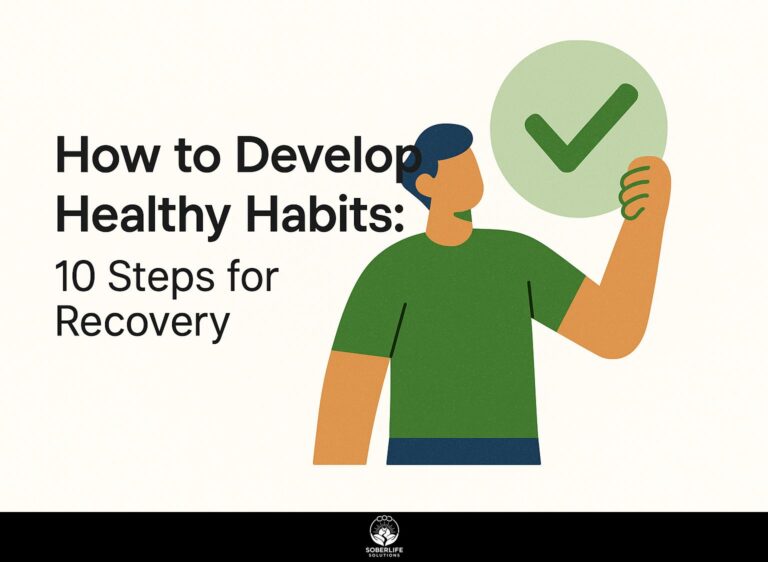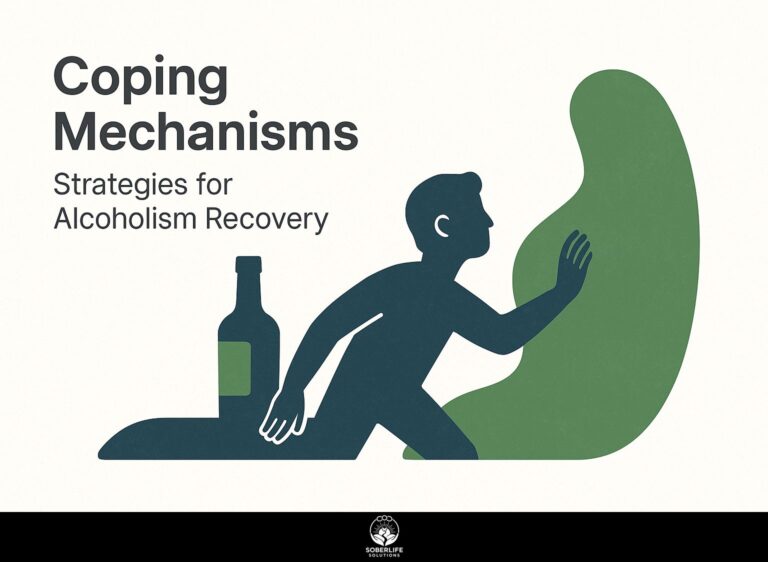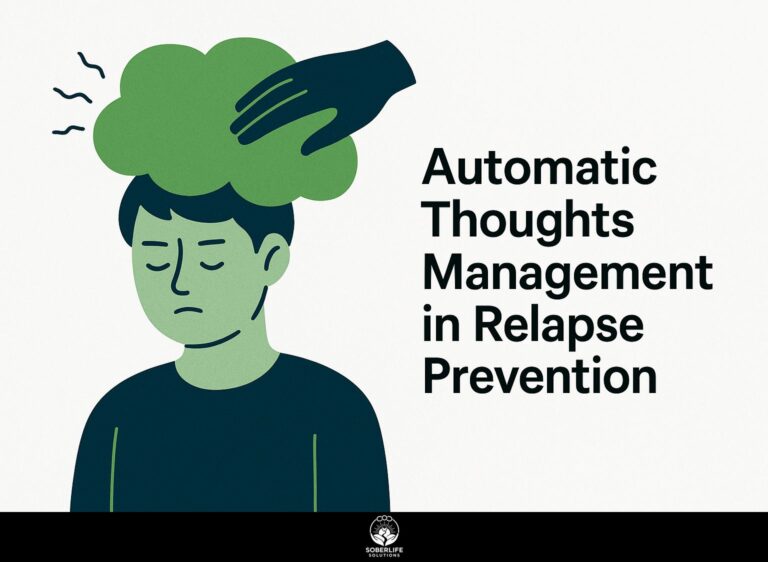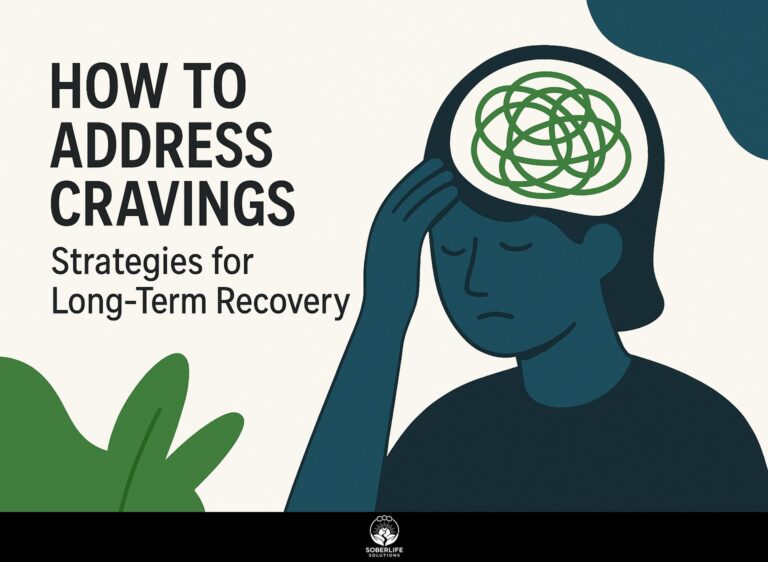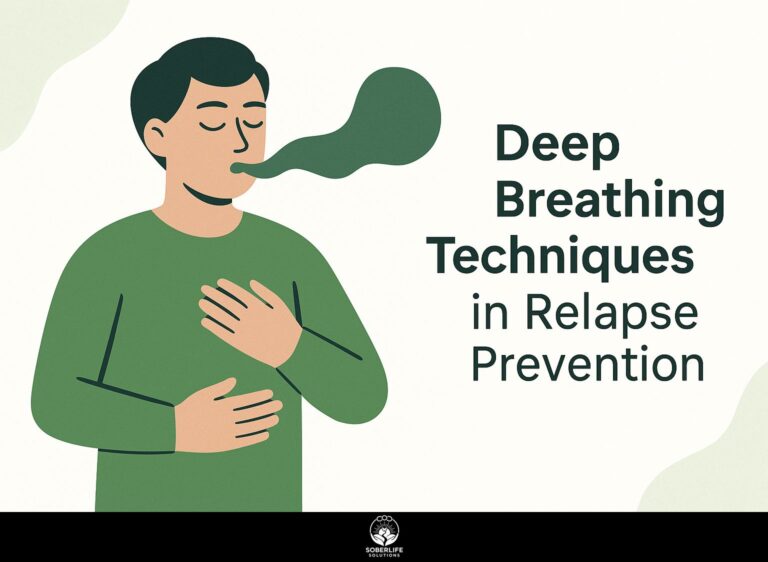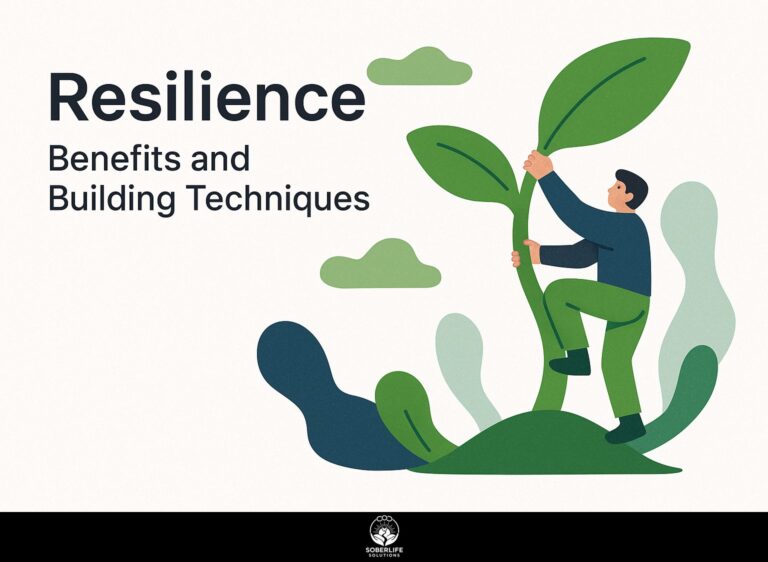Mindfulness-Based Relapse Prevention: Program Benefits
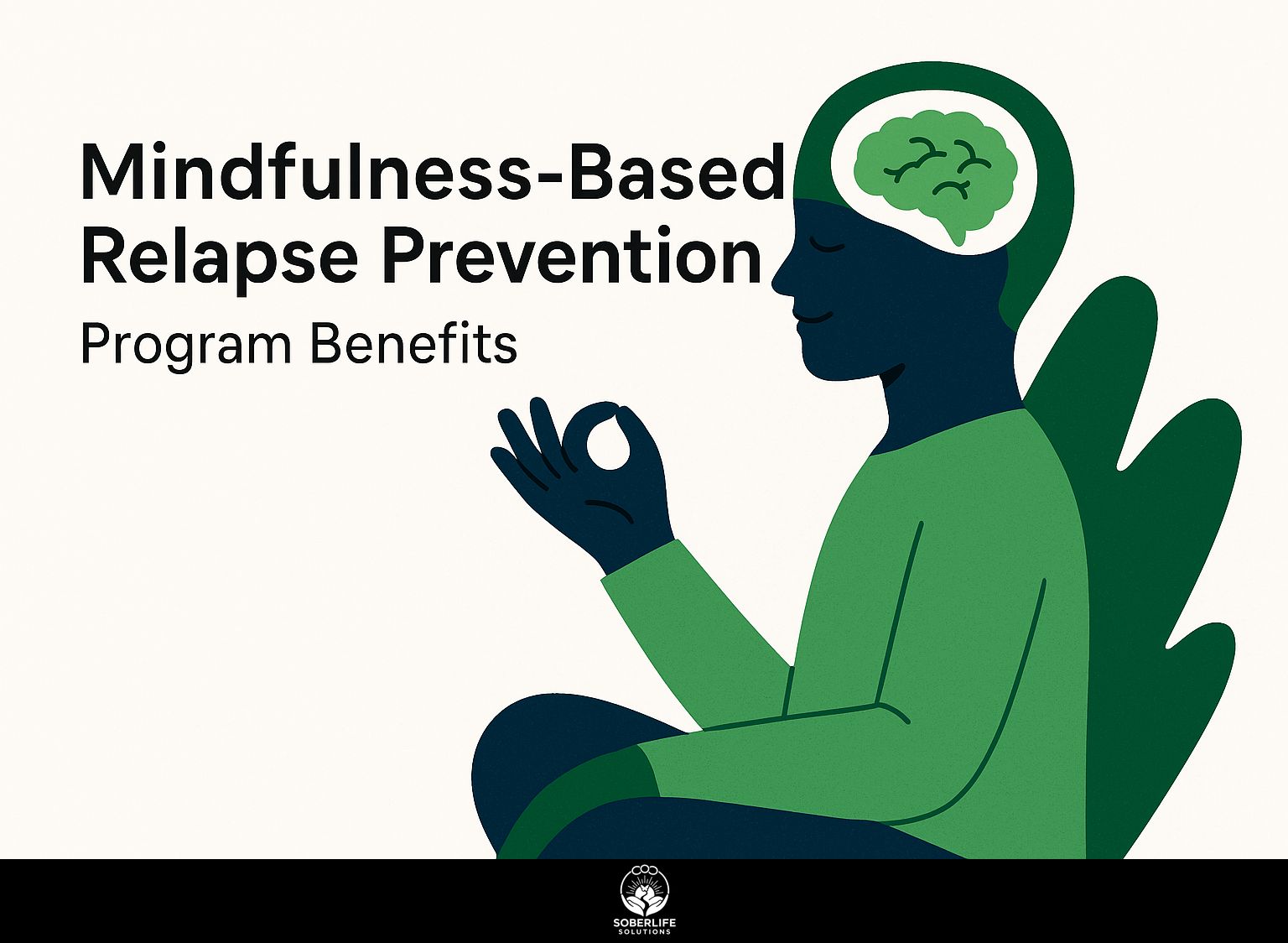
Mindfulness-based relapse prevention (MBRP) provides significant advantages for people looking to recover permanently from substance use disorders (SUD). By including mindfulness practices, this new method helps improve emotional control and build effective coping strategies. In this article, we’ll discuss how MBRP can lower relapse rates and help people with SUD improve their health, making it an important method in current efforts to prevent relapse.
Key Takeaways:
Understanding Relapse
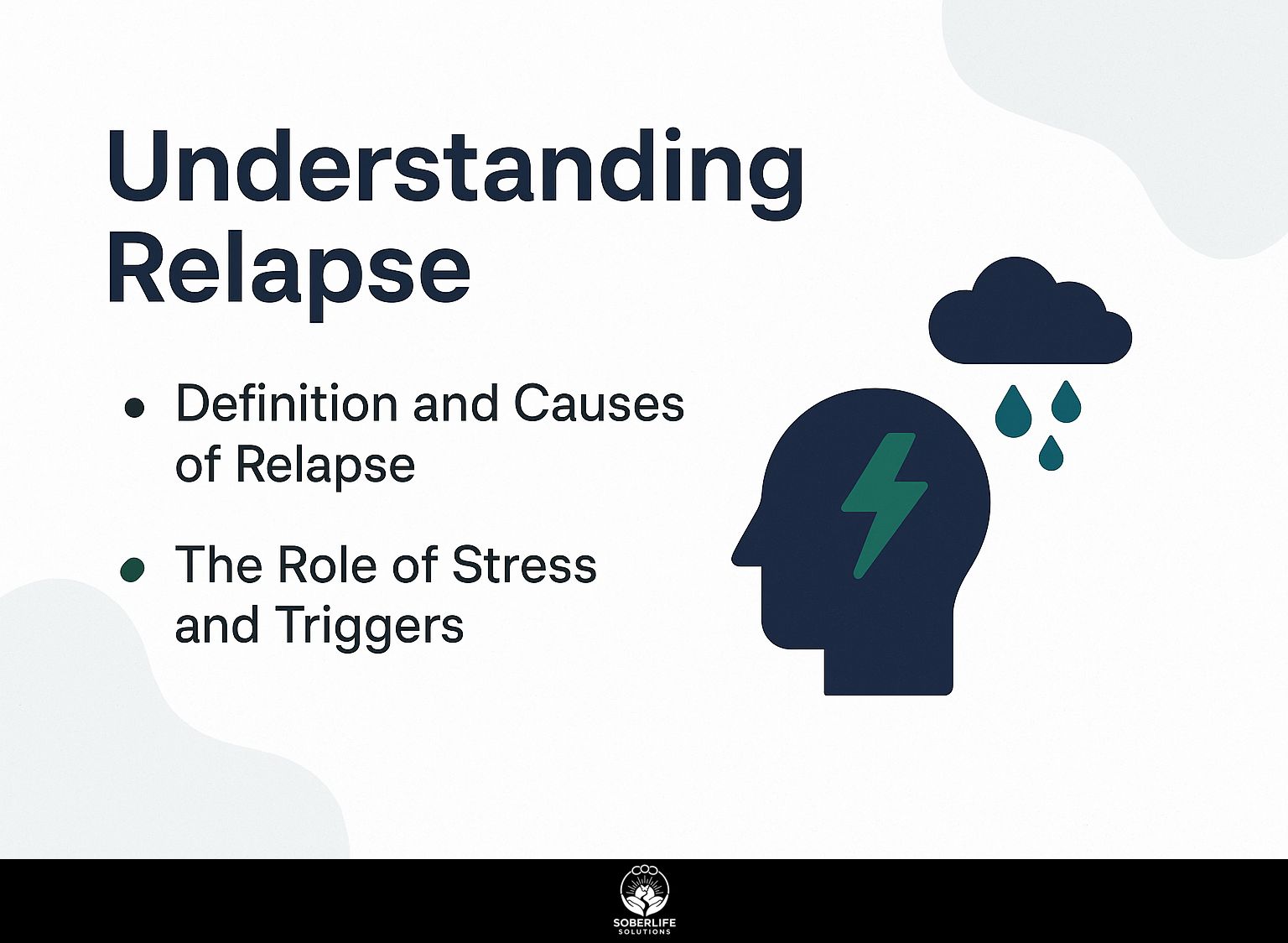
Relapse is important to study to create successful recovery plans because it is often caused by a mix of mental factors and external influences. Insights from a comprehensive study published by Taylor & Francis (expanded_context) delve into how relapse prevention can evolve into recovery protection, emphasizing the complexity and multifaceted nature of recovery processes. For those looking to craft effective strategies, discovering the key components of a relapse prevention plan can be crucial.
Definition and Causes of Relapse
Relapse is defined as a return to substance use after a period of recovery, often triggered by psychological factors such as cravings or internal distress.
Research highlights that approximately 40-60% of individuals with substance use disorders experience relapse, indicating the need for effective prevention strategies.
One critical approach is developing a strong support network-engage family members and friends in recovery.
Implementing cognitive-behavioral therapy can help manage triggers and cravings by teaching coping mechanisms.
Regular involvement in support groups like Alcoholics Anonymous (AA) or Narcotics Anonymous (NA) provides a sense of community and accountability, significantly reducing the likelihood of relapse. This aligns with findings from the Whole Health Library, which suggests comprehensive strategies for reducing relapse risk.
The Role of Stress and Triggers
Stress and environmental aspects can significantly increase the risk of going back to old habits, so it’s important to identify and address these factors in recovery strategies. This is supported by research published in Nature, which indicates that stress-induced reinstatement of drug-seeking behavior is a common challenge in addiction recovery.
To effectively cope with stress and prevent relapse, consider these actionable strategies. For a deeper understanding of the complexities involved, explore our comprehensive insights on identifying and preventing relapse triggers.
- Implement mindfulness training, such as meditation or deep breathing exercises, which can reduce anxiety and increase awareness of triggers.
- Develop a coping toolbox that includes activities like journaling or physical exercise, enabling you to redirect negative emotions.
- Build a reliable support network by using apps like Meetup to join recovery groups or meet friends who know your experience.
- Regularly review your progress and adjust your strategies to reinforce resilience against triggers.
Core Principles of Mindfulness
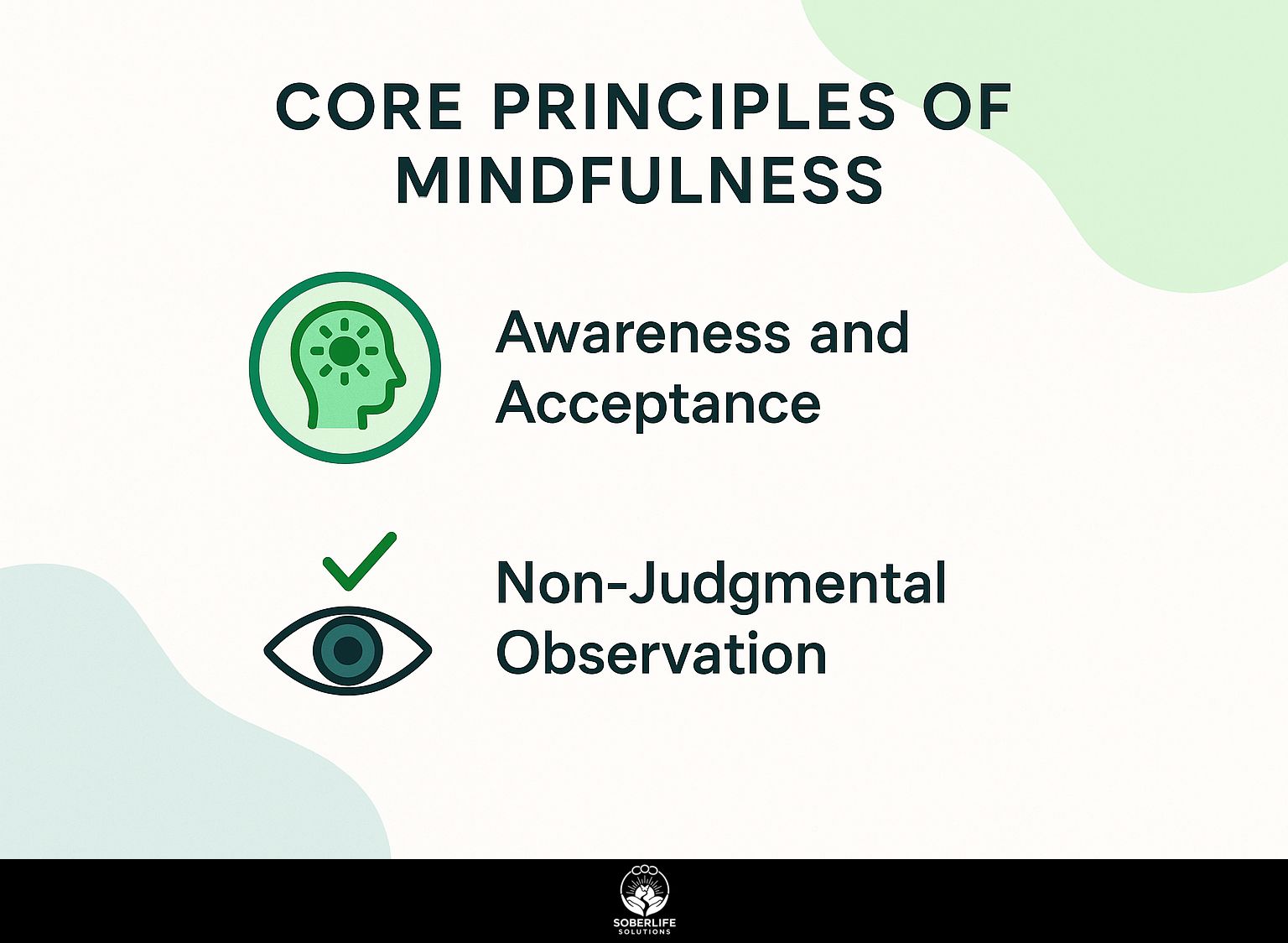
The basic ideas of mindfulness, like being aware and accepting, are important for improving recovery results for people with substance use disorders. If you’re interested in exploring how these concepts can be deepened through self-awareness practices, you might appreciate our insights into Developing Self-Awareness in Addiction Recovery.
Awareness and Acceptance
Awareness and acceptance form the foundation of mindfulness practice, enabling individuals to observe their thoughts and feelings without judgment.
To develop these skills, try doing body scan exercises and focusing on your breathing.
Begin with a body scan: lie down comfortably, close your eyes, and slowly focus on each part of your body, noting any sensations without trying to change them.
Next, dedicate a few minutes daily to breath awareness-simply notice your breath as it flows in and out. Apps like Headspace or Insight Timer provide guided meditation sessions that can be helpful.
These practices can help you deal with cravings and feelings of depression by encouraging you to be aware of your experiences without judging them.
Non-Judgmental Observation
Non-judgmental observation allows individuals to engage with their thoughts and feelings in a compassionate manner, reducing internal distress and enhancing emotional regulation.
To practice non-judgmental observation, consider incorporating techniques such as mindfulness journaling and guided meditations.
Mindfulness journaling involves writing down your thoughts without self-criticism, helping you recognize patterns in your thinking.
Guided meditations focus on breathing and present awareness, enhancing your ability to notice cravings and stress without immediate reaction. Apps like Headspace offer structured sessions that can help with this practice.
Regular involvement in these activities increases awareness, helping you control your emotions better.
Benefits of MBRP
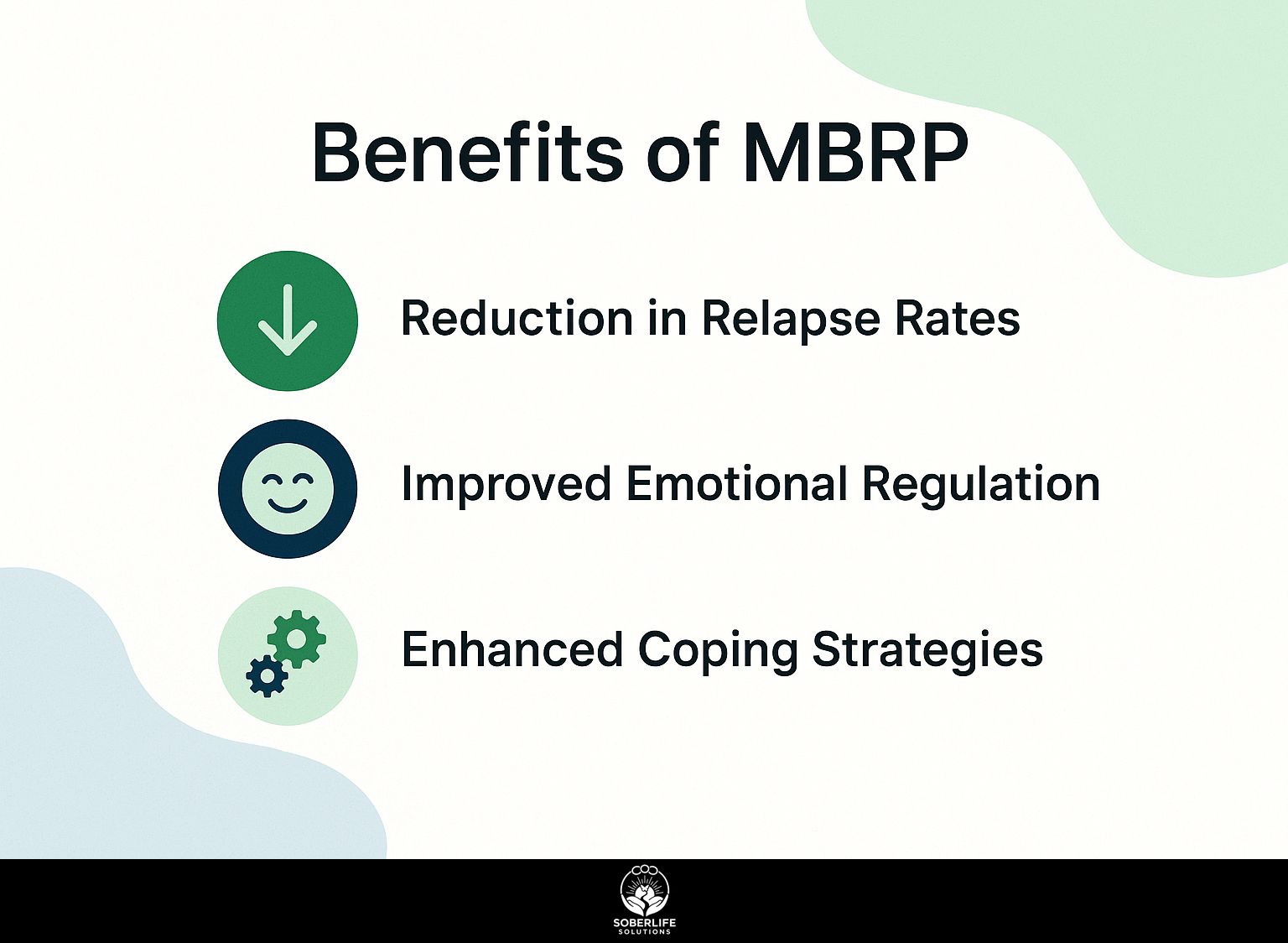
MBRP has been shown to significantly reduce relapse rates and supports people recovering from substance use disorders in better handling their emotions. This approach aligns with the principles outlined in our analysis of Mindfulness-Based Interventions for AUD: Implications.
Reduction in Relapse Rates
Studies indicate that MBRP can lead to a reduction in relapse rates by up to 60% compared to traditional treatment methods.
One study published in the journal Substance Use & Misuse demonstrated that participants in an 8-week MBRP program reported significantly lower cravings and improved mindfulness skills.
To improve these benefits, it’s important to include follow-up evaluations, like regular check-ins or progress tracking, which can give information about long-term results.
Using tools like mindfulness apps (e.g., Headspace or Calm) can help people keep up with their practice after treatment, which supports their recovery process.
Improved Emotional Regulation
People who take part in MBRP programs often say they get better at managing their emotions, which results in a better quality of life and fewer cravings.
One effective strategy taught in MBRP is mindfulness breathing. This technique, which involves focusing on your breath to anchor your thoughts, has been shown to reduce anxiety and increase self-awareness, helping individuals manage their emotional responses.
In addition, guided meditation sessions provided during the program teach participants how to observe their thoughts without judgment, allowing for a healthier emotional response to cravings. Regularly using these methods can greatly improve emotional resilience, supporting long-term recovery goals.
Enhanced Coping Strategies
MBRP helps people learn better ways to handle difficulties in recovery.
Key strategies taught in Mindfulness-Based Relapse Prevention (MBRP) include scenario planning for cravings and effective stress management techniques.
For instance, individuals learn to visualize situations that may trigger cravings and devise specific action plans to cope, like engaging in a brief mindfulness exercise or calling a support person. Stress management might include regular activities like deep breathing or yoga, chosen based on what the person likes.
Using these strategies has been connected to better treatment results, with participants saying they feel more in control of their recovery process.
Implementation of MBRP Programs
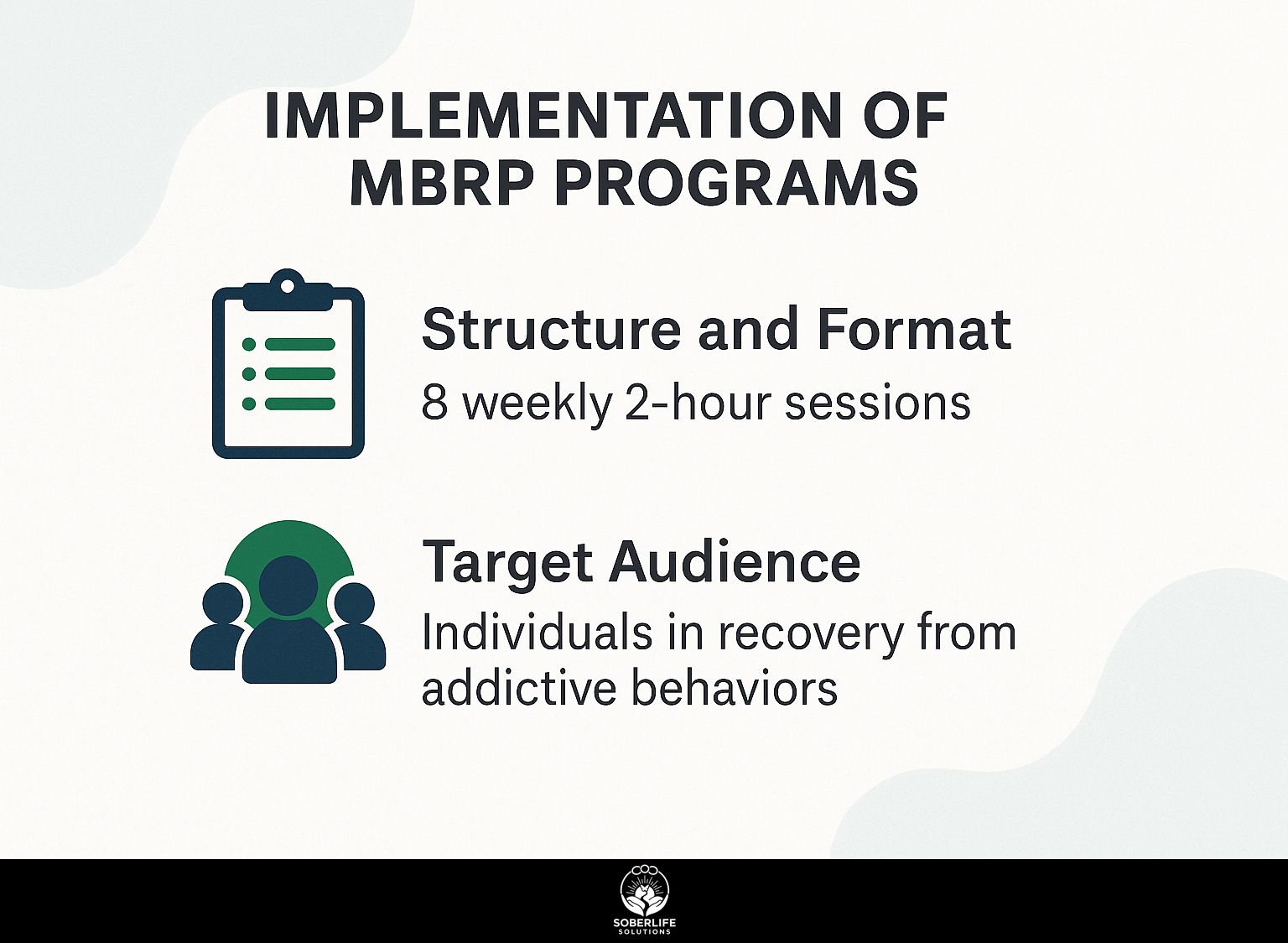
To successfully put MBRP programs into practice, it’s important to know their design, structure, and appropriateness for different groups of patients. Related insight: Mindfulness-Based Interventions for AUD: Implications
Structure and Format
MBRP typically involves a structured format that can include both group and individual sessions, lasting from eight to twelve weeks.
Each session often features specific themes, such as coping skills, emotional regulation, and mindfulness practices.
For instance, the first few weeks might focus on psychoeducation, helping participants understand the relationship between emotions and substance use. Durations can range from 90 minutes to two hours per session, allowing for both instruction and open discussion.
Worksheets and guided meditation audio can improve learning and support different ways of learning, helping participants stay interested and gain useful skills for daily use.
Target Audience
The target audience for MBRP primarily includes individuals recovering from substance use disorders, particularly those with co-occurring mental health issues.
Ideal participants are often those who have experienced multiple relapses or have underlying anxiety and depression.
Having support from others in the community greatly improves how well the MBRP program works by offering a group of supportive peers. For example, participants can talk about their experiences and ways to handle challenges, which helps build a community and responsibility.
Engaging in group discussions allows individuals to practice mindfulness techniques in a safe environment, reinforcing their recovery skills. Thus, having a helpful group of people is essential for staying sober and mentally healthy over time.
Frequently Asked Questions
What is Mindfulness-Based Relapse Prevention (MBRP) and how is it different from traditional relapse prevention programs?
Mindfulness-Based Relapse Prevention is a program that combines mindfulness practices with evidence-based relapse prevention strategies to help individuals maintain long-term recovery from addiction. It differs from traditional programs in that it focuses on developing present-moment awareness and self-compassion, rather than solely on avoiding triggers and managing cravings.
What are the benefits of participating in a Mindfulness-Based Relapse Prevention program?
Research has shown that individuals who participate in MBRP programs experience a reduction in relapse rates and a decrease in substance use, as well as improvements in overall well-being and quality of life. These programs offer helpful tools for dealing with stress, cravings, and tough emotions.
Is Mindfulness-Based Relapse Prevention suitable for all types of addictions?
Yes, MBRP programs are designed to support individuals in recovery from a variety of addictions, including substance use disorders, gambling addiction, and eating disorders. The focus on mindfulness and self-compassion makes this program applicable to any type of addiction.
What role does mindfulness play in preventing relapse?
Mindfulness is the practice of paying attention to the present moment with openness and curiosity. By cultivating this quality of awareness, individuals can learn to recognize and accept difficult thoughts, emotions, and sensations without reacting impulsively. This is important for avoiding relapse because it helps people handle triggers and cravings thoughtfully and with ability.
Do you have to be experienced in mindfulness to benefit from a Mindfulness-Based Relapse Prevention program?
No, prior experience with mindfulness is not necessary to benefit from MBRP. These programs are designed to be accessible to individuals at all levels, from beginners to those who have an established mindfulness practice. The key is a willingness to learn and engage in the practices.
How can I find a Mindfulness-Based Relapse Prevention program near me?
You can search online for MBRP programs in your area, or ask your therapist or treatment provider for recommendations. You can also contact local addiction treatment centers or recovery organizations to inquire about MBRP programs offered in your community.

